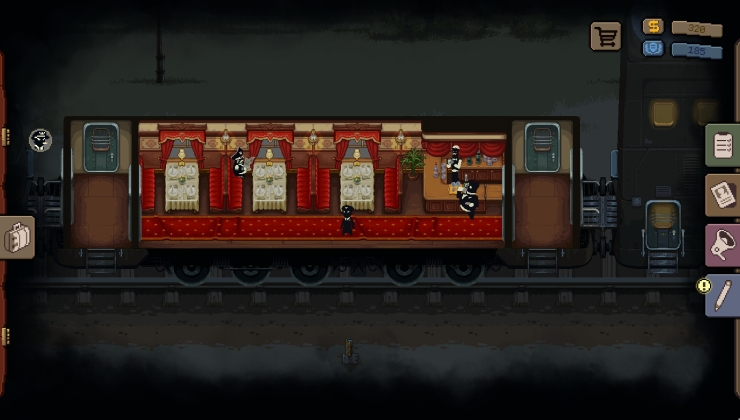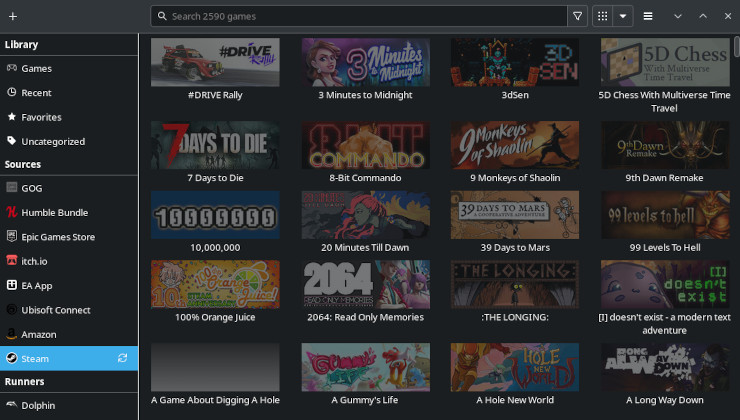After the recent upset caused by Canonical's plan to drop 32bit support in Ubuntu, then to turn around and change their plan due to the uproar caused by it, Valve now have a full statement out about their future support of Linux gaming.
Firstly, to get it out of the way, there's nothing to worry about here. Valve said they "remain committed to supporting Linux as a gaming platform", they're also "continuing to drive numerous driver and feature development efforts that we expect will help improve the gaming and desktop experience across all distributions" which they plan to talk more about later.
On the subject of Canonical's newer plan for Ubuntu 19.10 and onwards in regards to 32bit support, Valve said they're "not particularly excited about the removal of any existing functionality, but such a change to the plan is extremely welcome" and that it "seems likely that we will be able to continue to officially support Steam on Ubuntu".
However Arch Linux, Manjaro, Pop!_OS and Fedora all got direct mentions in this statement, when talking about how the Linux gaming landscape has changed and how there's a lot more options to have a good gaming experience. Valve said they will be working "closer" with more distributions but they have nothing to announce just yet on what exact distributions they will be officially supporting in future.
Also, if you're working on a distribution and you need a direct line with Valve, they suggested using this link.
You can see the full statement from Valve here.
Fantastic news, I will be completely honest, there was that little worry in the back of my mind that Valve would start pulling back but why would they? They've put a ridiculous amount of resources into our smaller platform, things have improved an astonishing amount since Steam arrived on Linux back in 2013 and it sounds like things will continue getting better.
I have to throw out a (huge) caveat: [security updates in Testing are not managed by the actual security team](https://www.debian.org/releases/testing/)! To me, that says stay away except for offline development or playing around in a VM. It shouldn't be your daily driver or your server.Debian Testing is also a good choice.At this point, what is the best Ubuntu alternative?Depends on what you're after. I left Ubuntu after they forced too many UI decisions I didn't like, so Mint was a natural choice for me. Similar look and feel to good old Ubuntu + Gnome.
Do you have information I don't that makes you comfortable recommending Testing?
It going to be interesting seeing how the Ubuntu 32bit debacle is going to affect the next round of PC stats here on GOL (provided everyone updates their PC info), how big is the hit to ubuntu going to be and where have been the big winners from this migration.
Chalk me up as adding to those stats!
I literally had finished assembling a new gaming PC, decided to go with 19.04 [tbf, it's actually incredibly nice to use]. I've used ubuntu on my gaming machines for years just due to the [usually] highest level of support.
But enough is enough. Not only the latest debacle, but I've actually never had a release-upgrade ever work properly, so I always stuck to LTS releases, which get *really* long in the tooth well before they go EoL. So I've now just wiped by near fresh 19.04 and installed Solus. And it's fantastic. Really great integrations for gamers right out of the box. Think I've found a new home for a while.
I still want my 64-bit port of steam. I think it's ridiculous that Steam is still 32-bit. I understand older games will never be updated but I think steam needs to be. I was really hoping that if nothing else that would come out of the Ubuntu fiasco but it's looking like I'll be stuck with 32-bit steam a while longer.
You can still provide the appimage with the game and all the required dependencies for 32bit applications, just a bit work on Valve's side.
Debian Testing doesn't security updates in a timely manner.
I have to throw out a (huge) caveat: [security updates in Testing are not managed by the actual security team](https://www.debian.org/releases/testing/)! To me, that says stay away except for offline development or playing around in a VM. It shouldn't be your daily driver or your server.The [primary task](https://wiki.debian.org/Teams/Security) of the Debian Security Team is to take care of stable releases that exist outside of the regular rolling life cycle.
Do you have information I don't that makes you comfortable recommending Testing?
The security team evaluates security threats, and produces updated packages for our stable and old-stable releases, and release these packages through security.debian.org together with an advisory mail.
The preferred situation is that the regular maintainer of an affected package (who is most familiar with its ins and outs) prepares updated packages or a ready to use patch which, after approval, will be uploaded to security-master. If the regular maintainer can't or won't provide updates (in time), the security team will take the task of creating the updated packages.
Security for testing and unstable is not officially guaranteed, but the team tracks those distributions as well in the security tracker. A number of regular volunteers outside of the team help with triaging issues on the security tracker.
Testing and Unstable still get security updates through the regular the update procedure. If a security issue is discovered, a fix will be uploaded with a high priority that will expedite its migration to Testing.
All updates are uploaded to Unstable first, so it gets all the security updates quicker. But it also gets all the bugs first, some of which would never reach Testing in the first place.
Therefore Testing is good balance between stability and up-to-date packages.
Experimental is not a branch of the distro you can install, it is only a bunch of packages that you can install (preferably on a Sid system) if you dare to do so.Very true. Experimental is just a collection of packages that are not suitable for inclusion in the the main repository. Things that potentially break other things go here. Also things that are out of scope for an upcoming stable release during the freeze period.
Debian 10 is releasing next week, and they are releasing with a stable Linux kernel 4.19 and Mesa 18.3. Therefore Linux kernel 5.0 and Mesa 19.1 are in Experimental right now. They will be uploaded to Unstable shortly after the release of Debian 10, and will continue the regular rolling life cycle.
On my work machine I run Testing as a default, with some packages from Unstable, because I don't want things to break too much when I am at work.
For gaming, I run Unstable with all the latest and greatest software, and Linux kernel and Mesa from Experimental.
You can usually mix the packages relatively safely, because they will fail to install if some dependencies are not met.
For example you can set your default release to be Testing and add the Unstable repository in your sources list.
echo 'APT::Default-Release "testing";' | sudo tee /etc/apt/apt.conf.d/99local-default-releaseecho "deb http://deb.debian.org/debian/ unstable main non-free contrib" | sudo tee /etc/apt/sources.list.d/debian-unstable.listThe packages will install from Testing by default, but you can switch to Unstable temporarily like this:
sudo aptitude -t unstable install linux-image-5.0.0-trunk-amd64Stable is mostly for enterprise environments, where you need stability and predictable upgrade dates. This also makes it a good choice for your not so tech savvy family members that you need to provide tech-support to. Hi mom, I love you. :)
Last edited by Linas on 28 Jun 2019 at 8:33 am UTC
Sounds a bit like Kubuntu where you install your graphics card drivers through the system settings panel rather than apt or Muon.If you've narrowed it down to two options, the only thing left to do is try both. if you want proprietary drivers remember to select it in the grub boot menu for manjaro's installation iso/usb/cd. Just so you won't have to install it manually later (although they do make installing it manually quite easy, you have to do it through the manjaro settings mangaer/mhwd rather than just installing the package via the package manager)But you know... have you considered debian?Debian and Manjora are the two I'm leaning towards if I were to change.
Anyway, the biggest obstacle at this point is simply a lack of time.
I personally run stable on my server because I don't want to have to worry about it breaking...that being said I run unstable/Sid on my gaming PC and have never had it break so I think I mainly use stable for the peace of mind just in case.Debian Testing doesn't security updates in a timely manner.I have to throw out a (huge) caveat: [security updates in Testing are not managed by the actual security team](https://www.debian.org/releases/testing/)! To me, that says stay away except for offline development or playing around in a VM. It shouldn't be your daily driver or your server.The [primary task](https://wiki.debian.org/Teams/Security) of the Debian Security Team is to take care of stable releases that exist outside of the regular rolling life cycle.
Do you have information I don't that makes you comfortable recommending Testing?
The security team evaluates security threats, and produces updated packages for our stable and old-stable releases, and release these packages through security.debian.org together with an advisory mail.
The preferred situation is that the regular maintainer of an affected package (who is most familiar with its ins and outs) prepares updated packages or a ready to use patch which, after approval, will be uploaded to security-master. If the regular maintainer can't or won't provide updates (in time), the security team will take the task of creating the updated packages.
Security for testing and unstable is not officially guaranteed, but the team tracks those distributions as well in the security tracker. A number of regular volunteers outside of the team help with triaging issues on the security tracker.
Testing and Unstable still get security updates through the regular the update procedure. If a security issue is discovered, a fix will be uploaded with a high priority that will expedite its migration to Testing.
All updates are uploaded to Unstable first, so it gets all the security updates quicker. But it also gets all the bugs first, some of which would never reach Testing in the first place.
Therefore Testing is good balance between stability and up-to-date packages.
Experimental is not a branch of the distro you can install, it is only a bunch of packages that you can install (preferably on a Sid system) if you dare to do so.Very true. Experimental is just a collection of packages that are not suitable for inclusion in the the main repository. Things that potentially break other things go here. Also things that are out of scope for an upcoming stable release during the freeze period.
Debian 10 is releasing next week, and they are releasing with a stable Linux kernel 4.19 and Mesa 18.3. Therefore Linux kernel 5.0 and Mesa 19.1 are in Experimental right now. They will be uploaded to Unstable shortly after the release of Debian 10, and will continue the regular rolling life cycle.
On my work machine I run Testing as a default, with some packages from Unstable, because I don't want things to break too much when I am at work.
For gaming, I run Unstable with all the latest and greatest software, and Linux kernel and Mesa from Experimental.
You can usually mix the packages relatively safely, because they will fail to install if some dependencies are not met.
For example you can set your default release to be Testing and add the Unstable repository in your sources list.
echo 'APT::Default-Release "testing";' | sudo tee /etc/apt/apt.conf.d/99local-default-release
echo "deb http://deb.debian.org/debian/ unstable main non-free contrib" | sudo tee /etc/apt/sources.list.d/debian-unstable.list
The packages will install from Testing by default, but you can switch to Unstable temporarily like this:
sudo aptitude -t unstable install linux-image-5.0.0-trunk-amd64
Stable is mostly for enterprise environments, where you need stability and predictable upgrade dates. This also makes it a good choice for your not so tech savvy family members that you need to provide tech-support to. Hi mom, I love you. :)
Last edited by Scoopta on 28 Jun 2019 at 3:21 pm UTC
I personally run stable on my server because I don't want to have to worry about it breaking...that being said I run unstable/Sid on my gaming PC and have never had it break so I think I mainly use stable for the peace of mind just in case.Debian Stable one the server is exactly what you should do. When I said that I run Testing at work I meant on my workstation.
Ahh, I see. Tbh one thing I didn't realize is that testing and unstable were separate. I knew they were separate repositories but I thought they basically had the same packages. I've never really looked much into testing. I've always either stuck with stable or unstable+experimental.I personally run stable on my server because I don't want to have to worry about it breaking...that being said I run unstable/Sid on my gaming PC and have never had it break so I think I mainly use stable for the peace of mind just in case.Debian Stable one the server is exactly what you should do. When I said that I run Testing at work I meant on my workstation.
Last edited by Scoopta on 28 Jun 2019 at 4:03 pm UTC









 How to set, change and reset your SteamOS / Steam Deck desktop sudo password
How to set, change and reset your SteamOS / Steam Deck desktop sudo password How to set up Decky Loader on Steam Deck / SteamOS for easy plugins
How to set up Decky Loader on Steam Deck / SteamOS for easy plugins
See more from me